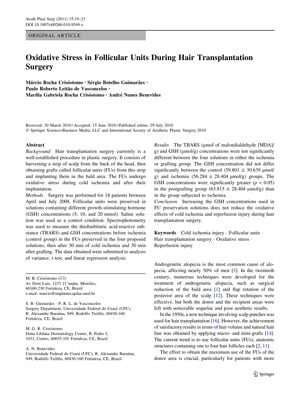TLDR Adding more glutathione to the preservation solution doesn't reduce oxidative stress in hair transplants.
The study, conducted on 18 patients from April to July 2008, explored the impact of oxidative stress on follicular units (FUs) during hair transplantation and whether antioxidant glutathione (GSH) could mitigate this stress. Despite varying the GSH concentrations in the preservation solutions (5, 10, and 20 mmol), the researchers found no significant changes in oxidative stress markers, measured by thiobarbituric acid-reactive substance (TBARS) and GSH levels, before and after ischemia and grafting. The study concluded that increasing GSH concentrations in the preservation solutions did not reduce oxidative stress during hair transplantation, suggesting that the methods used to detect oxidative stress in FUs might not be sensitive enough. Further research was recommended to enhance the detection sensitivity of oxidative stress in FUs.
251 citations
,
October 2006 in “Plastic and reconstructive surgery/PSEF CD journals” Using platelet plasma growth factors in baldness surgery can increase the number of hair follicles.
 153 citations
,
August 2002 in “Dermatologic Surgery”
153 citations
,
August 2002 in “Dermatologic Surgery” Follicular Unit Extraction (FUE) is a less invasive hair transplant method with minimal scarring, suitable for about 60% of patients, especially those needing fewer grafts and quicker recovery.
 22 citations
,
May 2000 in “American Journal of Clinical Dermatology”
22 citations
,
May 2000 in “American Journal of Clinical Dermatology” Treatments for common hair loss include minoxidil, finasteride, and hair transplantation.
 40 citations
,
December 1980 in “The Journal of Dermatologic Surgery and Oncology”
40 citations
,
December 1980 in “The Journal of Dermatologic Surgery and Oncology” An improved scalp reduction technique reduces the need for hair grafts and has minimal complications.
 3 citations
,
January 2019 in “International Journal of Trichology”
3 citations
,
January 2019 in “International Journal of Trichology” The balance of thiol-disulfide in women with hair loss is affected but not damaged.
 19 citations
,
November 2018 in “Nutrients”
19 citations
,
November 2018 in “Nutrients” Annurca apple extract may protect mouse hair from damage by chemotherapy and could help treat hair loss without promoting cancer growth.
 23 citations
,
April 2021 in “Journal of Clinical Medicine”
23 citations
,
April 2021 in “Journal of Clinical Medicine” Frontal Fibrosing Alopecia's cause is unclear, affects mainly postmenopausal women, and current treatments focus on stopping hair loss rather than regrowth.
 February 2026 in “Journal of Cutaneous and Aesthetic Surgery”
February 2026 in “Journal of Cutaneous and Aesthetic Surgery” Most emerging dermatological treatments lack strong evidence and require more research.
18 citations
,
October 2022 in “Biomedicines” Regenerative treatments for vitiligo show promise but need more research for long-term safety and effectiveness.









